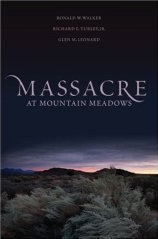Massacre at Mountain Meadows
 |
|
| Author |
Ronald W. Walker Richard E. Turley, Jr. Glen M. Leonard |
|---|---|
| Country | United States |
| Language | English |
| Subject | Mountain Meadows massacre |
| Genre | Non-fiction |
| Publisher | Oxford University Press |
|
Publication date
|
August 19, 2008 |
| Media type | Print (Hardcover) |
| Pages | 448 |
| ISBN | |
| OCLC | 220099516 |
Massacre at Mountain Meadows is a book by Latter-day Saint historian Richard E. Turley, Jr. and two Brigham Young University professors of history, Ronald W. Walker and Glen M. Leonard. Leonard was also the director of the Museum of Church History and Art in Salt Lake City, Utah. The book concerns the 1857 Mountain Meadows massacre in southern Utah, and is the latest study of the subject.
Though the massacre had already been the topic of numerous books, the authors observed there was a modern feeling that the LDS Church should invite "true reconciliation" by showing "more candor about what its historians actually know about the event". The authors agreed, writing:
Only complete and honest evaluation of the tragedy can bring the trust necessary for lasting good will. Only then can there be catharsis.
To this end, "[LDS] Church leaders supported [the] book by providing full and open disclosure." Although he wrote in his unofficial capacity, one of the authors, Turley, had been serving as an administrator over the church's historical programs since 1986.
Beginning their work in 2001, the authors did not intend to respond to earlier treatments on the massacre, but to instead take a "fresh approach" and amass all possible primary sources. Aside from available academic and scholarly sources, they were also granted access to the LDS First Presidency's archives. There they discovered the collection of past Assistant Church Historian Andrew Jenson, including the papers from his interviews with insiders in southern Utah during 1892. This was the first modern examination of the massacre that had access to these sources.
The authors avoided portraying the perpetrators and victims as good or evil, which would overlook their human complexity and the groups' diversities. Instead, they examined the massacre as a case of American frontier violence and vigilantism.
...
Wikipedia
